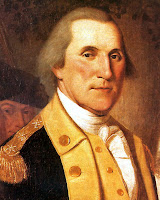
 Today is Presidents’ Day, a National Holiday celebrating the birthdays of our two greatest presidents, George Washington and Abraham Lincoln (No, it is not just an excuse for some really good sales!).
Today is Presidents’ Day, a National Holiday celebrating the birthdays of our two greatest presidents, George Washington and Abraham Lincoln (No, it is not just an excuse for some really good sales!).
Washington, as we all know, was Commander in Chief of the Continental Army, leading the American victory over Britain in the Revolutionary War. The pivotal battle in the American War of Independence was the Battle of Yorktown, when Washington’s army defeated Cornwallis’s British Army. Cornwallis died in 1805, but certainly his life affected the Regency.

- Cornwallis wasn’t just a bad guy, as I thought in elementary school. In fact, he took leave from the Revolutionary War to be at the side of his dying wife.
- Cornwallis wasn’t perfect, though. He did not exactly approach the defeat of Yorktown as a gentleman. Instead, he feigned illness and sent his second in command to formally surrender his sword to Washington.
- He did redeem himself in the eyes of Britain, though, going on to become civil military governor in India and Ireland and bringing about significant changes. In Ireland he helped to bring about the Act of Union, and in India, Permanent Settlement.
- Half of Washington’s army at Yorktown were French soldiers under the command of Rochambeau.
- Washington, who could not tell a lie, sent fake dispatches to Cornwallis’s superior in New York, convincing him that the American attack would be on New York and not Yorktown.
Abraham Lincoln was born in 1809, a year before “our” Regency time period and his leadership during the American Civil War made him one of our greatest presidents, but, in looking into how his life might have intersected with Britain, I discovered things I did not know.
- Lincoln was almost involved in a war with Britain.

- Queen Victoria’s Prince Albert was instrumental in averting this war.
The Prime Minister, Lord Palmerston, wrote a harsh ultimatum to President Lincoln, basically threatening war. When this letter reached Queen Victoria for approval, she sought her husband’s advice. Prince Albert, ill with the fever that would take his life soon after, rose from his bed to draft a less volatile missive, one that would not provoke war. It was his last political act.
- Lincoln was almost involved in a world war.
Thank goodness Queen Victoria listened to her husband.
Ain’t history grand? What historical facts have surprised you recently? What are you doing this Presidents’ Day?
I have a new contest on my website.
